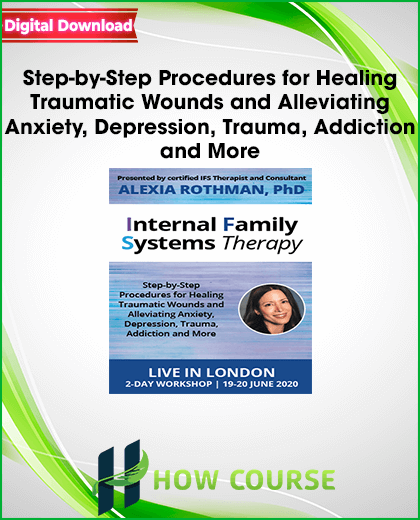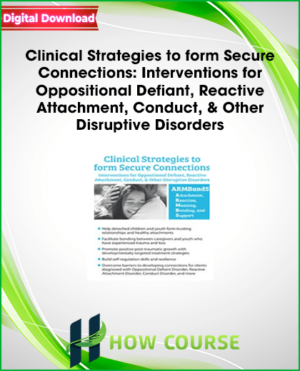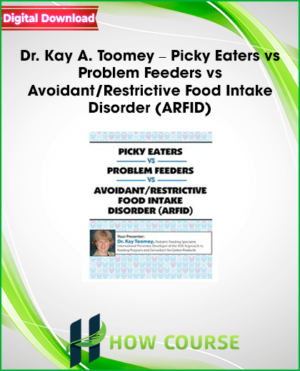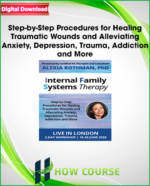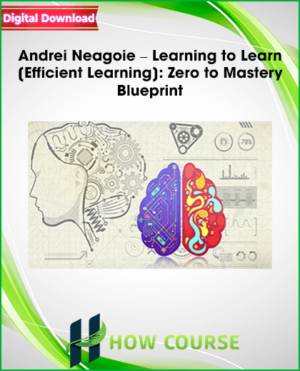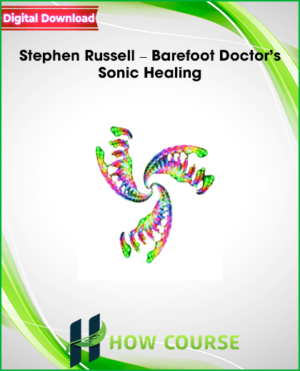Dr. Alexia Rothman – Internal Family Systems Therapy: Step-by-Step Procedures for Healing Traumatic Wounds and Alleviating Anxiety, Depression, Trauma, Addiction and More
Description
After decades of clinical innovation and recent scientific research, the empirically validated Internal Family Systems (IFS) model has been shown to be effective at improving clients’ general functioning and well-being. This effective model provides clinicians with procedures for helping clients with the most challenging mental health profiles to heal the wounded, burdened, and traumatized parts of their systems.
The IFS model provides a compassionate, respectful, non-pathologizing approach to understanding the organization and functioning of the human psyche.
The transformative IFS approach embraces and celebrates the natural multiplicity of the mind. Its assumption that every part of the system has good intention and valuable resources allows clinicians to approach even the most troubling of “symptoms” with compassion and respect. IFS offers therapists a powerful and effective set of tools for empowering clients with a wide range of clinical profiles to heal the wounded and burdened parts of their internal systems, resulting in:
a way to enter clients’ inner ecology without the overemphasis on containment and stabilization
symptom reduction and improved functioning for clients
deep self-healing within even the most troubled clients
IFS is a powerful treatment modality. Once you experience it, you will want to incorporate it into your practice.
Through instruction, video demonstration, and experiential exercises, Alexia D. Rothman, Ph.D., Certified IFS therapist and colleague of Dr. Richard Schwartz (founder of IFS) will show you step-by-step how to apply the most effective, empirically validated IFS interventions to help your clients connect with and understand their conflicting parts to facilitate deep, lasting healing.
Handouts
Manual – Internal Family Systems Therapy (6.88 MB)
53 Pages
Available after Purchase
Outline
Internal Family Systems (IFS)
Comprehensive, compassionate, non-pathologizing treatment approach
Paradigm-shifting perspective on “psychopathology”
Easily integrated into other therapeutic modalities
Teach clients to access inner wisdom and self-compassion to permanently heal traumatic wounds
Evolution of the Model
Development of the IFS model by Richard C. Schwartz, Ph.D.
IFS as an empirically validated treatment: Summary of research support
Composition of the Psyche
Concept of multiplicity: “We are all multiple personalities.”
Components of the psyche:
Wounded, vulnerable, parts
Protective parts: proactive and reactive
Burdens: Negative beliefs about oneself
The Self: compassionate inner leader and internal source of wisdom and healing energy
Guide clients to access their own inner wisdom and healing potential
IFS-specific techniques for in-the-moment emotion regulation, helpful even with panic, flashbacks, and dissociation
The IFS Model
Assumptions of the model
Goals of IFS therapy
Flow of the IFS model over the course of treatment
Flow of an individual IFS session
Case Conceptualization in IFS
Diversity and cultural sensitivity
How IFS understands personality disorders, dissociative identity disorder, and addiction
IFS Step-by-Step
Step 1: Using Meditative Processes to Identify and Connect with a Target Part
Differentiate the person from the symptom
Access a state of compassion and curiosity essential for healing
Establish a relationship with the target part
Learn the history and benevolent intention behind the symptom
Step 2: Working with Protective Parts
Facilitate internal attachment work
Learn and address the fears/concerns of protective parts
Establish a trusting and appreciative relationship with proactive and reactive protectors
Gain permission to proceed to healing
Step 3: Healing the Traumatic Wound
Develop a compassionate, connected relationship with the wounded part
Witness the pain rather than re-experience it: Learn to be “with”, not “in”, to avoid re-traumatization
Retrieve the wounded part from “trauma time”
Release/unburden thoughts, feelings, and beliefs
Integrate change into the system and use maintenance and troubleshooting strategies
Bringing IFS Concepts to Life
Experiential exercise
Video demonstration of IFS therapy with a real client
Step-by-step commentary to solidify understanding of techniques illustrated in the video session
Faculty
Dr. Alexia Rothman, Ph.D. Related seminars and products: 1
Alexia (Lexi) D. Rothman, Ph.D., is a certified IFS therapist and consultant in Atlanta, GA. Dr. Rothman has been in private practice since 2004. She has received extensive training in Internal Family Systems Therapy from IFS developer, Dr. Richard Schwartz, and has assisted in multiple Level 1 and 2 IFS trainings around the country, as well as serving as a professional consultant for IFS therapists.
She is a United States Presidential Scholar who graduated summa cum laude from Emory University as a Robert W. Woodruff Scholar. Dr. Rothman received her Ph.D. in clinical psychology from UCLA, where she was an Edwin W. Pauley Fellow and a National Science Foundation Graduate Research Fellow. She has held adjunct faculty positions at Emory University and Agnes Scott College.
Speaker Disclosures:
Financial: Alexia Rothman maintains a private practice. She receives an honorarium from Center for Self Leadership. Dr. Rothman receives a speaking honorarium from PESI, Inc.
Non-financial: Alexia Rothman is a member of the American Psychological Association; and the Georgia Psychological Association.
> Please contact our team if you have questions, or broken links via our email [email protected].

